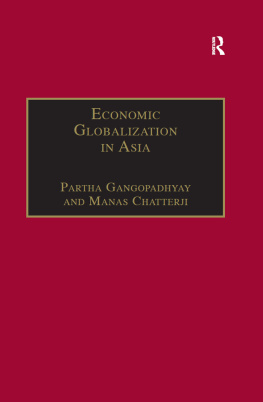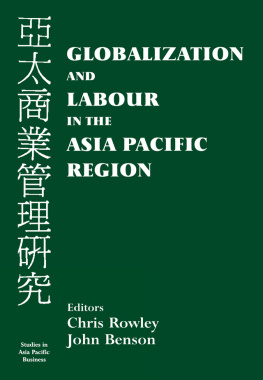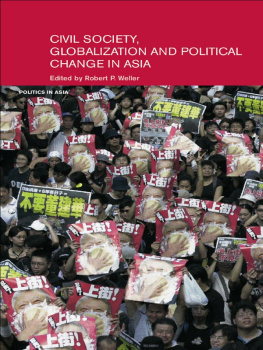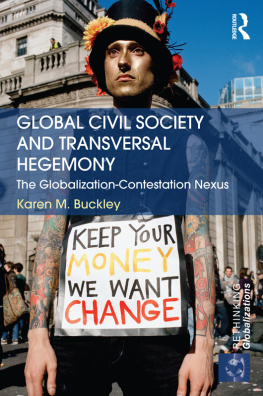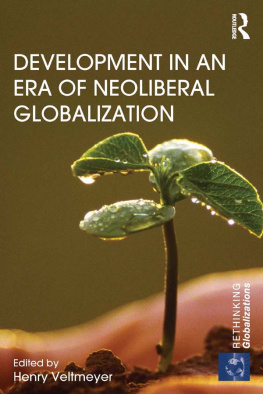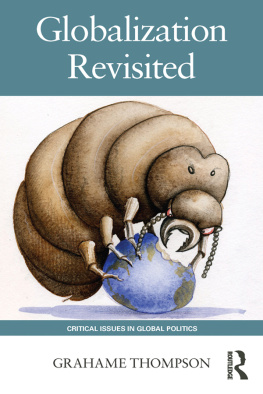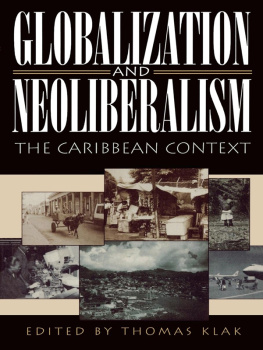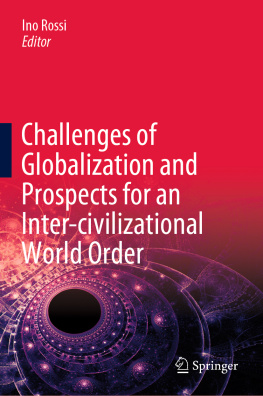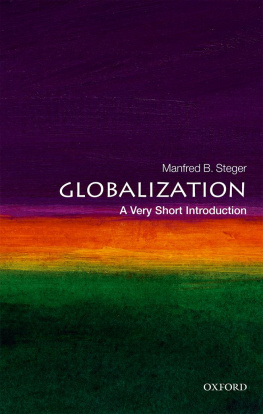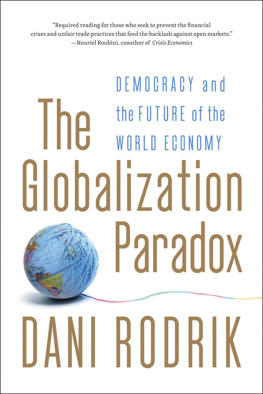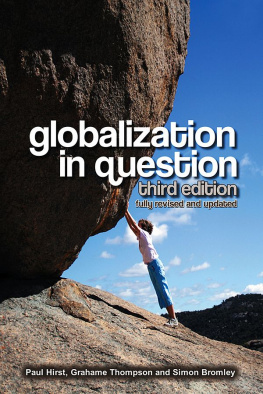ECONOMIC GLOBALIZATION IN ASIA
Economic Globalization in Asia
Edited by
PARTHA GANGOPADHYAY
University of Western Sydney, Australia
and
MANAS CHATTERJI
Binghamton University, New York, USA
First published 2005 by Ashgate Publishing
Published 2016 by Routledge
2 Park Square, Milton Park, Abingdon, Oxon OX14 4RN
711 Third Avenue, New York, NY 10017, USA
Routledge is an imprint of the Taylor & Francis Group, an informa business
Copyright 2005 Partha Gangopadhyay and Manas Chatterji
Partha Gangopadhyay and Manas Chatterji have asserted their right under the Copyright, Designs and Patents Act, 1988, to be identified as editors of this work.
All rights reserved. No part of this book may be reprinted or reproduced or utilised in any form or by any electronic, mechanical, or other means, now known or hereafter invented, including photocopying and recording, or in any information storage or retrieval system, without permission in writing from the publishers.
Notice:
Product or corporate names may be trademarks or registered trademarks, and are used only for identification and explanation without intent to infringe.
British Library Cataloguing in Publication Data
Gangopadhyay, Partha
Economic globalization in Asia
1.Globalization - Economic aspects - Asia 2.Financial crises - Asia - History - 20th century 3.Asia - Economic conditions -1945- 4.Asia - Economic policy
I.Title II.Chatterji, Manas, 1937-
338.95
Library of Congress Cataloging-in-Publication Data
Economic globalization in Asia / by Partha Gangopadhyay and Manas Chatterji, [editors].
p. cm.
Includes bibliographical references and index.
1. Asia--Economic policy. 2. Asia--Economic conditions. 3. Asia--Foreign economic relations. 4. International trade. 5. International economic integration. 6. Globalization--Economic aspects. I. Chatterji, Manas, 1937- II. Gangopadhyay, Partha.
ISBN 978-0-7546-4114-8
HC412.E21752004
337.5--dc22
2004018314
ISBN 9780754641148 (hbk)
Contents
Matthew F. McHugh
Partha Gangopadhyay and Manas Chatterji
David McHardy Reid and John Walsh
Tsuyoshi Koizumi
Frank L. Bartels and Hafiz Mirza
Lawrence H. Summers
Clive Hamilton
Chander Kant
Chang Woon Nam
Partha Gangopadhyay
Leong H. Liew
Alok Ray
Lilai Xu and (Late) J.C. Liu
Jocelyn Horne
Binh Tran-Nam
Koichi Mera
Bill Lucarelli and Joseph Halevi
Stanislav Menshikov
A. Nekipelov
Jonathan Batten and Samanthala Hettihewa
Amit S. Ray and Saradindu Bhaduri
Frank L. Bartels, Nanyang Technical University, Singapore
Jonathan Batten, Macquarie University, Australia
Saradindu Bhaduri, Jawaharlal Nehru University, India
Manas Chatterji, Binghamton University, USA
Partha Gangopadhyay, University of Western Sydney, Australia
Joseph Halevi, University of Sydney, Australia
Clive Hamilton, The Australia Institute, Australia
Samanthala Hettihewa, University of Western Sydney, Australia
Jocelyn Horne, Macquarie University, Australia
Chander Kant, Seton Hall University, USA
Tsuyoshi Koizumi, Hyogo College, Japan
Leong H. Liew, Griffith University, Australia
(Late) J.C. Liu, Binghamton University, USA
Bill Lucarelli, University of Western Sydney, Australia
Matthew F. McHugh, World Bank, USA
Stanislav Menshikov, Russian Academy of Science, Russia
Koichi Mera, University of Southern California, USA
Hafiz Mirza, University of Bradford, U.K
Chang Woon Nam, Institute for Economic Research, Munich, Germany
A. Nekipelov, Russian Academy of Science, Russia
Alok Ray, Queens University, Canada
Amit S. Ray, Jawaharlal Nehru University, India
David McHardy Reid, Rochester University of Technology, USA
Lawrence H. Summers, Harvard University, USA
Binh Tran-Nam, University of New South Wales, Australia
John Walsh, Curtain University of Technology, Australia
Lilai Xu, La Trobe University, Australia
Matthew F. McHugh
The Asian financial crisis has had a profound effect not only on the nations of that region, large and small, but on the global marketplace more generally. It is important that we understand the causes of that crisis, as well as the lessons to be learned from our experience in coping with it. Most of the papers in this diverse collection deal with recent economic developments in Asia, including their implications for institutional reform, trade, the development of the private sector, and a variety of related topics. In some cases, the scope of these papers extends beyond economics, touching upon political, social and cultural changes.
Whether the developments considered are economic, political, social, or a combination thereof, they are all occurring in the context of globalization and often at a rapid pace. This poses challenges, as well as opportunities, for policymakers and others in the mix.
As Thomas Friedman observed in his best-selling book, The Lexus and the Olive Tree, globalization is the international system that replaced the Cold War system. Protesters in Seattle and elsewhere may decry the system, but it is surely with us and is likely to be for some time. It is driven by powerful technologies that are integrating our societies more each day, and by the aspirations of people for a better life who see no alternative to plugging into this system. Like it or not, in economic terms, the winners in todays world will be those who understand globalization and accommodate themselves to it.
However, accommodation can be difficult, even painful. Governments must adopt free market policies that often run counter to established interests protectionism must give way to open trade, state run enterprises need to be privatized, corruption and crony capitalism must be abandoned, banking, legal and regulatory systems need to be reformed. Government and business must be more transparent. In short, to integrate into the global marketplace, nations must put institutions, programs and policies in place that will attract and sustain private investors; the ultimate engine of growth in any society.
Globalization generates some understandable concerns. While it promotes economic growth, the benefits of this growth are not always equitable. The most vulnerable in society can be left behind. Moreover, beyond the economic consequences, globalization is often seen as bringing with it foreign values which break down traditional cultures. Muslim countries, for example, often associate globalization with Western values with which they are not particularly comfortable. These concerns need to be addressed if there is to be economic, social and political stability. There is no obvious alternative to globalization today, and societies do need to act on this reality. Those that lack the experience of financial capacity to adapt on their own deserve the help of the more fortunate, since we all have an interest in promoting growth and stability. At the same time, the stresses and inequities that accompany such rapid change need to be remedied. Many developing countries cannot yet cope with globalization unaided. The international community, through institutions like the IMF, the World Bank, and others, must help. The recent experience in Asia, and its impact elsewhere, has been instructive. It was both a crisis and an opportunity. The international community did respond and most countries, with appropriate assistance, have adopted policies, which provide hope for the future. The papers presented here reflect this experience and contribute to our knowledge of a rapidly changing, but compelling world.

